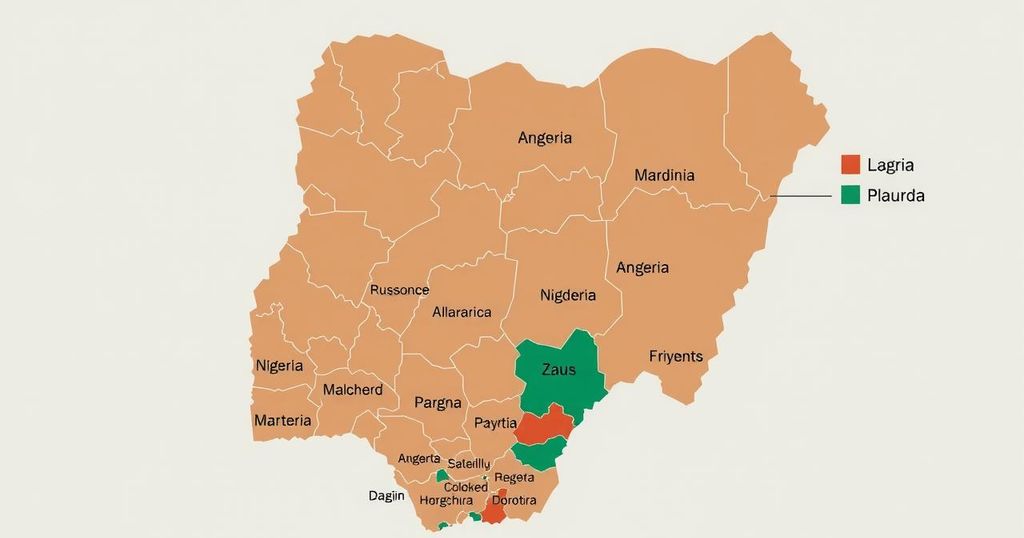Nigeria Faces Shift Towards a One-Party State Amid Political Turmoil

Nigeria’s political landscape is drifting toward a de facto one-party state as many lawmakers defect to the ruling APC, undermining the opposition parties. Legally a multiparty democracy, the reality is that most remaining parties cannot effectively challenge the APC, a situation reminiscent of PDP’s dominance from 1999 to 2015. Internal turmoil within opposition parties exacerbates the issue, raising pressing questions about the future of democracy in Nigeria.
Nigeria’s political landscape is precarious, as experts warn the nation is de facto shifting toward a one-party state, despite being legally recognized as a multiparty democracy. Nigeria’s political journey began in 1923 with Herbert Macaulay’s Nigerian National Democratic Party and has seen a handful of parties over the decades. Officially, there are 19 registered parties but many believe they lack the strength to contest effectively against the ruling All Progressives Congress (APC).
The significant defection of lawmakers from various parties into the APC has raised eyebrows. Elected figures have jumped ship, leaving the remaining parties fragmentary and without real power, which is similar to how the Peoples Democratic Party (PDP) dominated the political scene from 1999 to 2015. At that time, it was commonly said “PDP and others,” highlighting its supremacy. The political situation has flipped, and now the phrase has morphed into “APC and others” following the exodus of opposition leaders. This atmosphere could harm democratic principles.
Looking globally, supposedly two-party systems like those in the United States, the United Kingdom, and Ghana are technically multiparty democracies. While Democrats and Republicans dominate in the U.S., many smaller parties exist. The same pattern arises in the UK with various parties contributing to the political dialogue. Meanwhile, Ghana boasts 15 registered parties, with the National Democratic Congress and the New Patriotic Party leading the fray.
Since the Fourth Republic began in 1999, Nigerian elections have mostly been contested between PDP and APC. However, the current political crisis has been exacerbated by opposition parties that are battling internal leadership disputes. The PDP has cycled through national chairmen wildly since losing its grip on power in 2015. It is noteworthy that since then, four different leaders have presided over the party, each encountering their own set of troubles.
The Labour Party faces similar turmoil, dealing with internal conflicts that have undermined its stability. As for the New Nigeria Peoples Party, which recently achieved a significant gubernatorial win, it is not immune from leadership squabbles either. APGA also only recently resolved its own disputes, but as we know, a divided house simply cannot stand.
If Nigeria is ever to escape this de facto one-party state, opposition parties must conquer their intraparty strife. The successful formation of APC in 2013 was born from a tactical merger across several parties that came together to offer a united front. Mass defections from the opposition may only continue unless parties can stabilize internally.
The narrative that the APC wields undue influence to lure opposition members is subject to scrutiny. Historical incidents suggest that political survival can drive defections, often informed by the desire for better electoral prospects rather than mere opportunism. Allegations of corruption do little to curb this phenomenon—individuals will still seek self-preservation even if joining the perceived ruling party doesn’t guarantee protection from prosecution.
Ultimately, having effective governance should matter more than the prevailing political system. Despite the challenges of a fragmented multiparty framework, Nigeria’s governance is lacking in many key areas like security and economic development. For instance, China, a one-party state, exhibits remarkable advancement in both economic growth and technology against Nigeria, which struggles with high unemployment and rampant poverty. Thus, regardless of party affiliation, what truly counts is improving the quality of life for all citizens. The call for good governance transcends party lines and demands a focus on results that benefit the populace.
In summary, Nigeria’s political system is teetering on the edge of becoming a one-party state, primarily through mass defections to the APC. The implications of this shift cast doubt on the strength of opposition parties, many of which face severe internal conflicts. Such strife jeopardizes the health of democracy in Nigeria. While the legal framework supports multiparty democracy, the effective governance the populace desires hinges on resolving these internal issues and addressing systemic corruption, insecurity, and economic struggles. A reevaluation of priorities is seen as necessary for citizens to benefit from their governance regardless of the political structure in place.
Original Source: punchng.com







